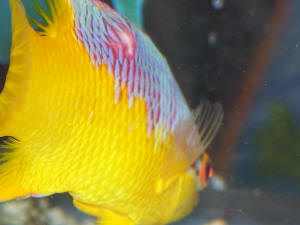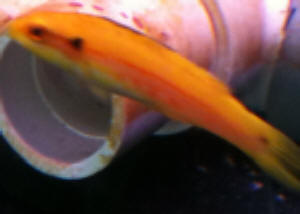|
FAQs on Hogfish Wrasses, Genera Bodianus,
Lachnolaimus Disease/Health
Related Articles: Hogfish Wrasses,
Lachnolaimus maximus,
Related FAQs: Hogfish 1, Hogfish
2, Lachnolaimus maximus, Hogfish Identification, Hogfish Behavior, Hogfish Compatibility, Hogfish Selection, Hogfish Systems, Hogfish Feeding, Hogfish Reproduction, Wrasses, Wrasse Selection, Wrasse Behavior, Wrasse Compatibility, Wrasse Feeding, Wrasse Diseases,
|

|
|
Yellow Wrasse with Black spots, ID, trtmt.
6/19/12
Hi crew,
<Joan>
Let me first mention how much I appreciate your help and responses. So
far, you've saved a beautiful Birdsnest coral for me and calmed my fears
regarding a Firefish concern. You're wonderful!!
<Ahh!>
I have a new concern that I've searched info on all weekend and just
need a bit of support to be sure my decision making is valid or should
be altered.
I purchased a yellow wrasse 10 days ago. I don't believe he is a true
yellow wrasse but would be interested in your opinion on the species.
Pictures are attached. He is yellow with pink/orange shaded sides and
light orange spots down the side. He has a black dot on the tail, behind
the eye, and 3 on the dorsal fin. What species of wrasse is this?
<Bodianus bimaculatus;
http://www.wetwebmedia.com/marine/fishes/wrasses/bodianus/index.htm
Background info: He was at the LFS for 3 weeks prior to purchase in
copper solution. His dorsal fin was missing sections with a beat-up
look. I fresh dipped him with RO water
<Freshwater itself is fine... RO needs to be aerated... as it has no
gas/oxygen>
and Methylene blue upon arrival for 2 1/2 minutes.
He was wild during the process even managing to jump out. I didn't keep
him in the dip any longer than this due to his behavior. He then went
into the QT tank. Seven days into the QT process, he suddenly developed
small black spots/smudges on his back on both sides of his dorsal fin.
<Not a problem>
The pictures are blurry due to his constant movement, but I hope you can
glimpse the areas of concern. I'm just not sure if we are looking at
black ick, worms, or a bacterial infection. QT water is zero for
ammonia, nitrites, and phosphorus.
So far, I've added PraziPro to the water. We are now on Day 4 of the
medication and no changes in the spots/smudges. I thought my next step
would be too start hyposalinity for 4 weeks and possible add an
antibiotic during this process.
<Mmm, I wouldn't. Just isolation should suffice>
During this entire time, he acts totally normal.
Eating well, swimming around, curious and doing fine. What are
your thoughts on the spots? The treatment plan?
<Not a worry; no treatment>
As always, your support is tremendous.
Thank you,
Joan
<Welcome. Bob Fenner>
|
 |
Cuban hogfish <hlth., sys.> and other questions... Refugium
algae... 1/31/07 Hello Crew, thanks for this great
outlet of information. I have a Cuban hogfish around 3
inches I have had for about a month. I initially had him in
a 10 gal quarantine tank but a week ago I put him in my 29 gal reef
refugium (5" DSB) to give him more room. Almost the
whole time I have had him he has hidden behind whatever available
structure that was in the tank. He has eaten little since
his arrival. <Not atypical, or to be unexpected...> I feed him
live ghost shrimp, scallops, and dried anchovies. He snubs
any pellet/ flake food offered thus far. <Time, patience...> For
day upon a time he will just hide and not come out when the food is
offered. <Also reasonable behavior> If I take out his hiding
place he will swim around and explore but as soon as the structure is
replaced back to the hole he goes. What can I do, if anything to speed
up his acclimation to aquarium life? <Mmm, little... this species
needs much more room... and time> He is the only fish in the tank
including the (46 gal) reef tank. Do you think putting a
saltwater acclimated molly in the tank would stimulate him from his
hiding spot? <Mmm, maybe> Also do these fish have a broom like
fins, like the broom-tailed Wrasse? <Not really>
I'm wondering because his fins look uniformly ratty.
<Likely resultant/shipping damage... will repair in time of its own
accord> I have one other unrelated question. Would I be better off
buying more algae for a mud/algae (mud less at this time) sump to lower
nitrates or building a coil denitrator? <Either perhaps... maybe
both> This is for a 120 gal reef tank with a full bio
load. I currently have a 27 gal sump with two types of algae
in it. The lights in the sump are on 24/7. <... Depending on the
species... Really only Caulerpaceans can be illuminated continuously...
other algae require a/the dark period...> Thanks again for this
site. Chad <Thank you for your letter. Bob Fenner>
Re: Cuban hogfish and other questions... HLLE
issues 1/31/07 Thanks for the reply. Do you think
I should go ahead and place the hogfish in the 46 gal reef tank? He was
placed in the 29 gal so I could keep a close eye on him. Eventually
after he becomes more boisterous I will transfer him into the 120 gal
reef tank. <I would do this straight-away... You are aware of the
possibility of a Bodianus species consuming crustaceans et al. I take
it> The fish's lateral line seems slightly exposed from about
the middle of his body the base of his tail. Should I be worried?
<Mmm, no... you should be aware, pro-active... could very well be
neuromast destruction/HLLE beginnings> I have a Passer Angle
<Angel> fish that developed hole in the head (which is now
healing fine) it seemed like a day after I placed him in this 46 gal
tank. He was in there to fortify before going into the 120. <Good
plan> Does the erosion take place that fast <Can> or do you
think it could have taken place in the quarantine tank and just went
unnoticed? Thanks again and it is truly an honor to hear from you.
Chad
<Mmm, and you. Bob Fenner>
| Spanish Hogfish Bump 6/18/06 Good Morning,
Bob. <Scott> Scott here from Blue Marlin again. I
have a quick question about a raised bump that I found on a Spanish
Hogfish yesterday. <I see it...> I received him
from the wholesaler on Tuesday the 13th of this week. He
has been on a 10 gallon QT since then and late yesterday I noticed
a small bump which appear to be growing under the surface of his
scales. His behavior was normal, no flashing darting or
scratching. I fed him as normal and took a wait-and-see
attitude. This morning the bump appears to be raised
more and he is occasionally scratching on the piece of dead coral I
have in his QT. On one of his scratching passes, I saw a
few scales actually fall off of him. He is eating as usual, like a
pig, but has taken to hiding behind the dead coral. The
bump looks more like a sore at this point, but I don't notice
any red spots or bleeding. I'm wondering if maybe he
injured himself and this is the result. <Maybe> I
have included a few pictures that I took this morning at about
11:00am. When I last checked the water quality of his
QT, I had the following results: Temp 78 Sal 1.022 pH
8.12 NH4 0 NO2 0 NO3 25ppm Alk 9.4 PO4 0.02 If you have
time today, can you give me a diagnosis? If you need
clearer pictures just let me know. Thanks a
ton! -- Scott C. Wirtz Owner Blue Marlin Aquatic
Creations <Mmm, could be a sore resultant from a trauma... but
could also be an expression of a parasitic problem... likely a worm
or crustacean species... If "worth" treating I would try
Fenbendazole/Panacur first (or Prazi)... See if this, or
coincidental time going by, results in a cure. Bob Fenner> |
|

|
|
|

